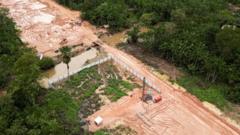As Brazil gears up for the COP30 climate summit in Belém, the construction of a new highway through protected Amazon land raises significant environmental concerns. While government officials tout the road’s supposed sustainability, critics argue it contradicts the summit’s aims, jeopardizing wildlife and local livelihoods.
Controversial Road Construction Threatens Amazon Ahead of COP30 Climate Summit

Controversial Road Construction Threatens Amazon Ahead of COP30 Climate Summit
A new highway in Brazil is cutting through protected Amazon rainforest, sparking outrage among locals and conservationists as the country prepares to host the COP30 climate summit.
A new four-lane highway is being constructed through protected areas of the Amazon rainforest to facilitate access for the upcoming COP30 climate summit in Belém, Brazil. This development, which spans tens of thousands of acres, aims to accommodate an influx of over 50,000 attendees, including global leaders, expected at the conference in November. However, local residents and environmental advocates express alarm over the severe ecological repercussions of the roadwork.
Local authorities claim the initiative is driven by "sustainable" principles, yet the rapid deforestation contradicts the summit's goals of addressing climate change and promoting conservation. The project has stripped the land of its rich biodiversity and threatens to displace wildlife, which relies on these areas for habitat.
The highway, spanning over 13 kilometers (8 miles), now stands as a stark reminder of the lost rainforest, with piles of logs indicating the extent of destruction. Residents like Claudio Verequete, whose açaí berry business has been destroyed, lament the loss of their environment and livelihoods. "Everything was destroyed," he explains, highlighting a grim future without compensation or support from the state government.
Critics are also concerned about the fragmentation of ecosystems, as the highway separates the forest, making it harder for animals to traverse the landscape. Wildlife vet and researcher, Prof. Silvia Sardinha, warns that "we will lose an area to release these animals back into the wild," emphasizing the broader implications of deforestation on wildlife rehabilitation efforts.
Amid the outcry, government officials assert that building this highway—known as Avenida Liberdade—will enhance mobility and serve as a legacy for the region. They claim that features like wildlife crossings and solar lighting will mitigate some environmental impacts; however, community members question the validity of these promises, feeling disconnected from the benefits touted by the authorities.
While city planners and businesses welcome new infrastructure improvements, the unpopularity of the road construction among local communities raises questions about the real beneficiaries of such developments. Business owners point to potential opportunities for economic growth; however, the consequences hold questions regarding their long-term sustainability.
As Brazil prepares to host world leaders at COP30, growing scrutiny surrounds whether the environmental damage caused by accommodating the summit undermines its intentions. Critics highlight the hypocrisy of flying thousands of attendees to discuss climate change while simultaneously contributing to deforestation.
The ongoing situation exemplifies the complexities of balancing development goals with environmental stewardship, as the voices of those living on the frontlines of climate degradation demand to be heard.



















